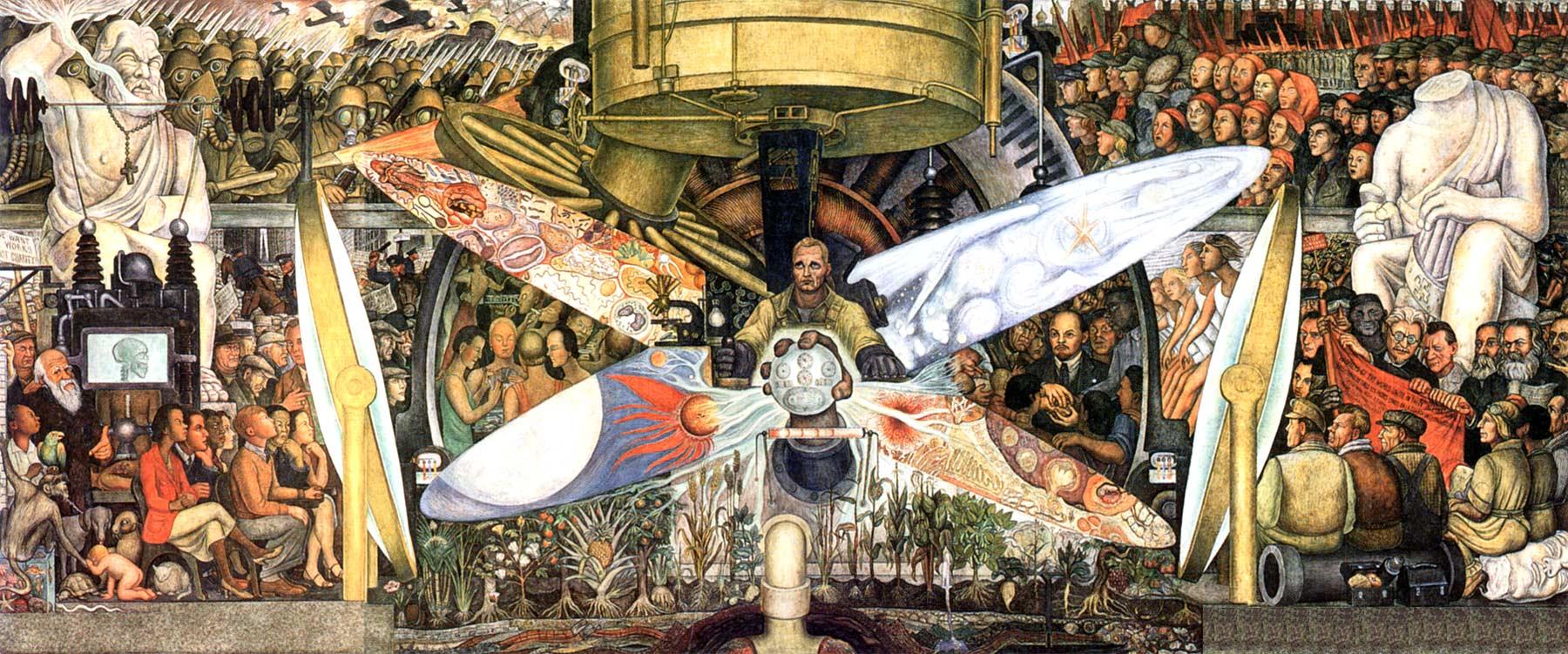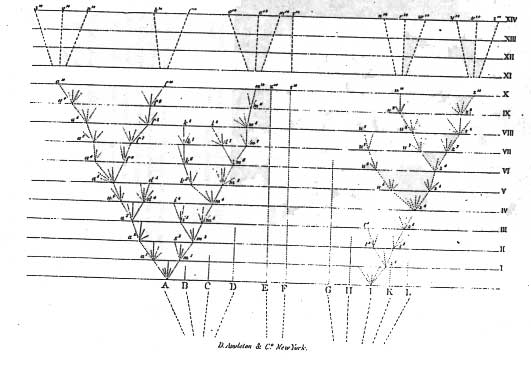Story of Evolution/Evolution of Stories
Bryn Mawr College
March 14, 2004
Eugenides' Ideas (Dangerous and Otherwise)
(pace Paul) About Evolution and Literature
Where we left off (and where I went in the meantime...)
| Two weeks ago,
Dennett was saying, "If a ... brain were truly capable of non-algorithmic activity, and if we have such brains, and if our brains are themselves the products of an algorithmic process ... turning the whole process... into a non-algorithmic process....This would be a cascade of cranes creating, eventually, a real skyhook!...Darwin has shown us how, in fact, EVERYTHING is just such a product....I can stand in affirmation of its significance." (pp. 448, 520)
Iva was saying, "an idea has been troubling me....all of our thoughts and actions could be just products of a very complex algorithm based on our experience....I understand how bothering this sounds but we might be just products of a very complex algorithm we haven't quite found yet..."
And Paul was responding,
"I want to be an agent, to MATTER, not only to be shaped by but to shape. So ...
- If evolution is genuine, the story DOESN'T end (Dennett notwithstanding)...
- There IS more there than genes and memes, certainly more cranes and perhaps even a skyhook created by cranes ..."
|
 |
I took all those ideas along with me to central Mexico last week,
where I saw repeatedly
Culture as a complex replica/revision/intensification/"improvement"(?) of nature
(Ex: Piramide del Sol @ Teotihuacan as a copy of a sacred mountain...)

Cultures building atop (and revising) cultures
(Exs: Templo de la Virgen de los Remedios,
atop the ruins of Piramide Tepanapa, in Cholula;
and the Plaza de las Tres Culturas....)
Cultures recyled and renewed
(Ex: Diego Rivera's uses of native art to express a new society...)

Man at the Crossroads, from Marxists Internet Archive
Scaling back to a "local" example...
On one of the late-blooming branches (of Darwin's Tree)

are human beings. In each of these humans, there are culture-making capacities
which can--we're postulating, following the model of biological evolutionary theory--draw on (and alter) what we've known and experienced to take us beyond what we have known
and experienced: to generate something new.
Here's how Jonathan Culler, in Literary Theory: A Very Short Introduction, describes "what literature is":
....note above all the complexity and diversity of literature...the possibility of fictionally exceeding what has previously been thought and written....Literature is a paradoxical institution because to create literature is to write according to existing formulas....but it is also to flout those conventions, to go beyond them...an institution that lives by exposing and criticizing its own limits.... Literature...is "cultural capital"...But literature cannot be reduced to this conservative social function...literature is the noise of culture as well as its information. It is an entropic force... (pp. 40-41)
We're going to use, as test case for the evolutionary process of writing and interpreting literature, Jeffrey Eugenides' novel Middlesex,
and begin by asking
- Where did this story come from?
- Why does it take the shape it does?
- What meanings do we make of it?
- How do we make those meanings?
- Wherefrom do they arise?
- What motivates them?
- How context-bound are they?
- What counts as relevant context?
- Of what further stories are this story and its meanings productive?
In other words: How useful is the story of evolution for thinking about the evolution of stories?
Well, to begin (again, again!) in the beginning, with
The Birds, the Bees, and 5-alpha Reductase Deficiency
This story has been told in a variety of ways.
What (other?) versions have you heard?
To begin (again, again, again...) in the beginning:
What do you see?
.JPG)
From From West Virginia University
Center for Reproductive Medicine
Emily Martin. "The Egg and the Sperm: How Science Has Constructed a Romance Based on Stereotypical Male-Female Roles."
Signs: Journal of Women in Culture and Society16, 3 (1991): 485-501.
It is remarkable how 'femininely" the egg behaves and how "masculinely" the sperm....Gerald Schatten and Helen Schatten liken the egg's role to that of Sleeping Beauty: "a dormant bride awaiting her mate's magic kiss, which instills the spirit that brings her to life". Sperm, by contrast, have a "mission," which is to "move through the female genital tract in quest of the ovum." One popular account has it that the sperm carry out a "perilous journey" into the "warm darkness," where some fall away "exhausted."' "Survivors" "assault" the egg, the successful candidates "surrounding the prize." Part of the urgency of this journey...is that "once released from the supportive environment of the ovary, an egg will die within hours unless rescued by a sperm." The wording stresses the fragility and dependency of the egg, even though the same text acknowledges elsewhere that sperm also live for only a few hours.
Evelyn Fox Keller, "Gender Language and Science" (1996 Templeton Lecture).
Until fifteen years ago, the experimental work done by biologists on fertilisation provided ample evidence to support chemical and mechanical accounts for...how the sperm could penetrate and activate the egg....no mechanisms for the activity of the egg were looked for; inactivity requires no mechanism, and such mechanisms were assumed not to exist....
Today a different metaphor has come to seem more useful, and clearly more acceptable. In contemporary textbooks, fertilisation is more likely to be cast in the language of equal opportunity. My favourite definition is from a textbook widely used by molecular biologists by Alberts et al called Molecular Biology of the Cell, but it is representative: Fertilisation is defined as "The process by which egg and sperm find each other and fuse"....In fact the research goes further, as if confirming some very deep seated fears. Current research sometimes endows the egg with archetypal powers: the egg sends out microvillae which "grasp" the spermhead and "drag" it to the ovum. Other, unwanted, sperm are incapacitated, ejected, or simply destroyed.
I suggest that this story illustrates exactly the ways in which language can shape our thinking and acting. It frames our attention, our perception and the fields in which we can envision ways to move....both metaphors were manifestly productive, albeit of different effects. One led to intensive investigation of the molecular mechanisms of sperm activity while the other fostered research permitting the elucidation of mechanisms by which the egg would have to be said to be active as well....this is a story about how gender ideology shapes the ways in which all of us see the world, men and women alike.
Eileen Talone, "Women Unite, Take Back Control of Human Development!" (February 11, 2005).
An organism has already run the gamut before it enters the world. In the case of sexually reproducing organisms, the male gamete won the statistically improbable prize of fertilizing the more discriminating female gamete, and through the process of zygotic development, is not guaranteed long life anyway. Any talk of selection begins in the formulation of the genotype....
My ultimate interest in sexual selection, as it is, was, and ever shall be, is in the world of human sized things and matters of human interaction....Geoffrey Miller, the author of Mating Mind: How Sexual Choice Shaped Human Nature, believes the importance of female choice in nonrandom sexual selection (that is, the second round of elimination that take place at sexual maturity) was overlooked when Darwin first suggested it in The Descent of Man and Selection in Relation to Sex, and has recently been accepted with the theories of biologists like Zahavi (cited by both Mayr and Miller), who reinforce the logic of female choice- as women produce far less gametes than males, they cannot waste their genetic material as freely as males....
Not for nothing have we inherited these costly brains, and since as Darwin posited and Mayr insists, the individual and not the gene...is the object being selected, it is the responsibility of the individual, whether male or female, to decide what it requires of mates and companions. Through selection we arrive at not perfection, but opportunities to develop who we are collectively through personal agency.
The way the story of fertilization is told has shifted.
Eugenides is likewise shifting, here, the way the story of gender identity is told....
He begins with Uncle Pete's explanation that
under the microscope, sperm carrying male chromosomes had been observed to swim faster than those carrying female chromosomes...to have a girl baby, a couple should have "have sexual congress twenty-four hours prior to ovulation." That way, the swift male sperm would rush in and die off. The female sperm, sluggish but more reliable, would arrive just as the egg dropped....
Meanwhile, in the greenroom to the world, I waited...The timing of the thing had to be just so in order for me to become the person I am. Delay the act by an hour and you change the gene selection....An infinite number of possible selves crowded the threshold, me among them but with no guaranteed ticket....
"How many possible men are there in that doorway?
...is the concept of identity simply inapplicable to unactualized possibles?"
(Willard Van Orman Quine, 1953, as qted. in Dennett, p. 104)
As interesting and important as the details of Callie's genetic history
is the evolution of her cultural history...
Who are her literary ancestors?
Besides scientific studies--
Specialized readers many have come across me in Dr. Peter Luce's study, "Gender Identity in 5-Alpha-Reductase Pseudohermaphrodites" ....
there are Greek myths--
Like Tiresias, I was first one thing and then another....
(Who was Tiresias?)

From OVID: METAMORPHOSES, BOOK III,
richly illustrated by famous artists in European history
Tiresias: The Transexual Blind Prophet
(Who was Ovid?)

...In all creation
Nothing endures, all is in endless flux....
Nothing retains its form; new shapes from old
Nature, the great inventor, ceaselessly
Contrives. In all creation, be assured,
There is no death--no death, but only change
And innovation....
...the earth and all therein, the sky
And all thereunder change and change again,
We too ourselves, who of this world are part,
Not only flesh and blood but pilgrim souls....
(1-8 A.C.E.)
(Eugenides again:) I want to get it down for good: this roller-coaster ride of a single gene through time. Sing now, O muse, of the recessive mutation on my fifth chromosome!...Sing how it passed down through nine generations....Sorry if I get a little Homeric at times. That's genetic, too.
In his
3 a.m. interview about the novel, Eugenides observes that the book
in contrast to the way hermaphrodites have appeared in literature -- miserable creatures like Tiresias for instance -- I wanted to write about a real person with a real condition....Originally, I worked from

the Memoirs of Herculine Barbin, published by Michel Foucault in the late seventies....But as an expression of what it is like to be a hermaphrodite, from the inside, Herculine Barbin's memoir is quite disappointing. She just tends to go into this moaning, talking about how misfortunate she is and ... it's sad. You can go and read it, but she didn't have enough self-awareness to be able to understand what was going on. In a way she was pre-psychological in her knowledge of her self. And when I read that book I didn't get any information about someone with such a condition....
In a way, some people say, the book is not about a hermaphrodite at all. And I understand that, it's about reinventing your identity on different levels, be that Greek to American, female to male....Reinvention of self is an enduring theme in American literature in general...this...has obviously Classical antecedents...and those are the things that inspired me: metamorphosis and changing....

Escher's "Metamorphosis" @ InSite
...my narrator is determined by her genes, she has this genetic mutation there's no escaping of. But the mutation does not make her who she is, does not determine everything about her life. There is still a great amount of free will and possibility in her life, and that's one of the things the book is strongly determined in.
At least one (local) critic took issue with this free range of identity.
From Bethany Schneider's 9/02 Newsday review of Middlesex:
Race, sex, nationality - all are rewriteable, reinventable..... But unfortunately the book is uncoordinated - it feels like a teenager, like it needed to grow up a bit before it was allowed to live in the world on its own. The breadth of plot and time and characters is only awkwardly handled by the first person narration of Cal....In addition to the problem of historical knowledge, Eugenides' denies his main character any interiority regarding the problem of gender identification. Cal insists that s/he has no deep psychological sense of her complex gender identity.
Cal lacks, in other words, the "persistent self" figured in
 He had two selves within him apparently, and they must learn to accommodate each other and bear reciprocal impediments. Strange, that some of us, with quick alternate vision, see beyond our infatuations, and even while we rave on the heights, behold the wide plain where our persistent self pauses and awaits us. (Chapter 15)
He had two selves within him apparently, and they must learn to accommodate each other and bear reciprocal impediments. Strange, that some of us, with quick alternate vision, see beyond our infatuations, and even while we rave on the heights, behold the wide plain where our persistent self pauses and awaits us. (Chapter 15)
There are, of course, multiple ways to interpret Eugenides' 21st century revision of Elioit's 19th century novel.
(What sort of tale does each of these covers "tell"?
What do you expect to find under each one?)
The production of literature, and the interpretations of its meanings--the results
of the encounter between text and reader, code and de-coder, which we call literary
criticism--generate new accounts, new stories....
Literary analysis is the making of new stories out of the stories
we have preserved; the most useful of those are continuously generative of what is
new. New stories come into being as we seek to identify a pattern that has a motive and a purpose....
Helped along by Culler's meditations on "language, meaning and interpretation"--
- Language is...both...the categories in which speakers are authorized to think--and
the site of its questioning or undoing (60)
- .... "reader-response criticism"...claims that the meaning of the text is the experience of the reader...an interpretation of the work can be a story of that encounter...but the story...depends upon...the reader's "horizon of expectations"...interpreting is a social practice (63)
- Meaning is both what we understand and what in the text we try to understand...is
undecided, always to be decided, subject to decisions which are never irrevocable....
Meaning is context-bound....context is boundless; there is no determining in advance what might count as relevant (67)
- Essentially...a plot requires a transformation. There must be an initial situation, a change ...and a resolution that marks the change as significant....there must be an end relating back to the beginning...that indicates what has happened to the desire that led to the events the story narrates....Plot is a way of shaping events to make them into a genuine story (85-86)
- ...what drives theory...is the desire to see how far an idea...can go....Theory does not give
rise to harmonious solutions...but the prospect of further thought...theory is...an
ongoing project of thinking which does not end (122)
- [theory] is endless...an unbounded corpus of writing which is always being augmented...a
resource for constant upstagings....unmasterable...open ended...the condition of life
itself...the questioning of presumed results and the assumptions on which they are
based. The nature of theory is to undo...what you thought you knew, so the effects of
theory are not predictable (15-17).
--we ask you to post by 5 p.m. on Tuesday
your reactions to Eugenides' novel,
your interpretation of it,
your responses to its genetic and literary history, as told here today...
whatever it is you are thinking about what you have been reading and hearing....
Further Reading:
Intersex Society of North America
20th Century TransHistory and Experience; Biographies and Essays
To end: a few more pictorial renditions of Callie's "genesis..."
| Course Home Page
| Science in Culture
| Serendip Home |
Send us your comments at Serendip

© by Serendip 1994-
- Last Modified:
Wednesday, 02-May-2018 10:51:48 CDT










.JPG)












